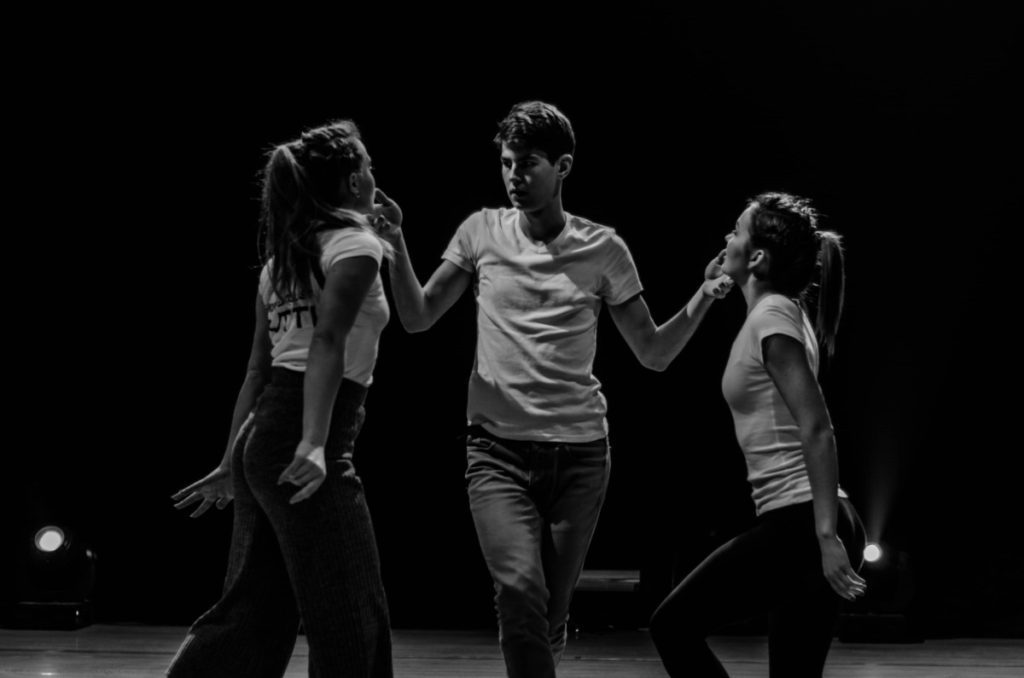Self Devised Theatre for Students

Self Devised Theater involves an ensemble group that workshops ideas, concepts, and issues in a series of improvisations while utilizing voice, physicality, and space. This process is in view of a collaborative performance that is often dynamic, creative, expressive, challenging, and explosive.
In basic terms devised theater is where practitioners create a performance piece from their own creativity in an improvisation manner with a view to perform.
What is the purpose Of Devised Theater?
The purpose of devised theater is to create a creative work for an audience which is created organically, in a collective approach. It is to present creative works to stimulate, entertain, and to provoke an audience in ways which they themselves may not be aware they need.
With students, it encourages working collaboratively while improvising and workshopping ideas in an environment that allows creativity to come to the foreground.
It also allows actors and students the opportunity to allow their creative juices to take form in whatever capacity to be utilized on stage. It also helps ownership of one’s work and the opportunity to feel a sense of accomplishment.
If tackling a personal issue or a wider issue such as Climate Change, the impact of Date tape, COVID 19, Body Image, or even friendship issues. Devising theater can inspire an integral meaning to a student which also encourages agency and independence when working with theater.
Because devised theater involves an organic, improvised, and collective approach it also encourages interdependence, which is a skill most companies or workplaces try to embed in their culture.
How Do You Devise Theater
Firstly you need to have a passion for an issue or the material you wish to perform. If you are passionate about your material, your audience will too.
Research your Material May Help in Your Devised Theatrical Works
Do research on your main theme as much as possible. Let’s say your theme is climate change, you would first read articles and sites which are up to date about Climate Change. Students would have that theme in mind while using creative ways to devise.
You would also research how to improvise in the theater. There are many articles and sites which will tell you how to do this easily.
However, if you are merely devising your work from an organic basis this absolutely a great method from which from.
Be Flexible When Using Other Ideas
Typically a devised theater piece would be done with fellow performers and directors. That means that there should be different ideas going into the pile of possibilities. You need to have an open mind about trying out different ideas because you never know if another great idea may arise as a result. If one idea doesn’t seem to work, throw it out and try something new.
When You have Good Ideas Write them down
It is good to write down your ideas and regarding what worked and what didn’t so that you can try and replicate it in further workshops.
It is also a good idea to film your rehearsals and or workshops.
If you loved the idea of devising theater, checkout how to utlize Readers Theater for kids and adults here with my last post.
Use Humour and or Tension
What can create good drama is a problem which needs to be solved. If the drama is too easy for the audience to figure out, it’s isn’t going to enthrall them. Your devised theater should surprise, enthrall, and excite the audience to think outside their own box so to speak.
A great quote from Jacques LeCoz:
“Everything moves. Everything develops and progresses. Everything rebounds and resonates. From one point to another, the line is never straight.”
Practical Ways to Devise Theater
In Pairs to Devise
Have one student make an offer and the other person must go with that offer. From there the journey to a simple story will unfold. It is also a good idea to write down ideas that work, so you can utilize them in a further setting.
Working In Groups to Devise
Devise scenes using tableau with a basic beginning, middle, and ending. A person can write a basic storyline as you workshop in the group. Remember to bring in the problem and climax and some sort of resolution if devising a narrative.
However devised theater can be quite random, so anything goes. (Although if you are going for purely a creative piece disregard the narrative format)
The more an ensemble workshop ideas, improvise using their voices, bodies, and the space at hand the more likely they are to come up with brilliant ideas.
My lastest posts which you can find linked here:
- Ten Ways To Learn HOW TO DEVELOP CHARISMA AS AN ACTOR EffectivelyDeveloping Charisma as an actor means you have the correct mindset, you give attention to all people, being likeable, using open body language, using appropriate eye contact, having an articulated voice, utilising bad boy characteristics, using the power of makeup and having an appealing appearance overall.
- How To Act Drunk on Stage and ScreenHow To Act Drunk on Stage and Screen If you have landed a role and it requires you to be drunk, firstly it’s a great idea NOT to actually hit
- SELF DEVISED THEATERelf Devised Theater involves an ensemble group that workshops ideas, concepts, and issues in a series of improvisations while utilizing voice, physicality, and space. This process is in view of a collaborative performance that is often dynamic, creative, expressive, challenging, and explosive.
- HOW READERS THEATER CAN BE UTILIZED IN THE CLASSROOMHomepage Readers Theater involves students who read out loud a play or a simple script in its simplistic form. This is usually without props, scenery, or furniture. Students can re-write
- HOW DRAMA CAN HELP BUILD CONFIDENCEoneself. It develops the voice, physicality, experience of working with others, listening skills, and communication to name a few. Drama is a goldmine for skill-building towards developing your confidence.
Using Music to Stimulate Ideas for Devising Theater
Use music such as opera or alternative music and have students move around in the space. They spontaneously take on movement and tableaux as they work with the music. From here certain theatrical elements can be established to forward the piece on.
Let the music dictate the action or the feeling in the piece. The beat, rhythm, and or syncopation can be utilized to help to accent a movement piece for example.
Oftentimes improvised, theater, and or movement pieces are devised purely for the audience to garner meaning.
Other times devised theater performs as a traditional theatrical piece.
Devising Theatre Using High and Low Status
Rumour has it we all have a certain personal status in which we all have and utilize on a daily basis. However, this status can often change depending on our relationship with others.
We have high status for our children, but lower status with our bosses. We might be cleaner but have naturally high status and our boss may have a natural low-status personality, but plays high status. Once again it all depends on the situation at hand or the relationships we have with others.
Some fun ways to devise theater is using high and low-status characterization individuality or in groups.
Students can try on different statuses from their own natural status. It is a lot of fun to try high or low status in an improvised situation, but not always easy to do. Some naturally high-status people have difficulty playing lower and vice versa.
This can in itself make an interesting performance piece because something is askew, but you can’t quite put your finger on it.
Here is a great video to show how to work with a group on status.
(video)https://www.youtube.com/watch?v=0-_QItaSa4I
Start Out Small and Work Towards The Big Picture.
If improvisation and devising a whole play is challenging for you, have an ensemble work on one scene at a time. Have different groups work on different scenes at a time, but using the same theme or a derivative of it, and then have them come together to perform.
An example can be where one person leads the improvised work using their voice or body and their small group imitate them for a short piece. Each ensemble group can perform their devised piece back to the rest of the group for feedback.
From here you can make a whole piece come alive in a relatively less stressful way, especially if you don’t have something in stone closer to the date of your performance.
Improvisation Games To Help You Devise Scenes
One word at a Time
Story-time
Yes-And
Narrative
SpaceJump

